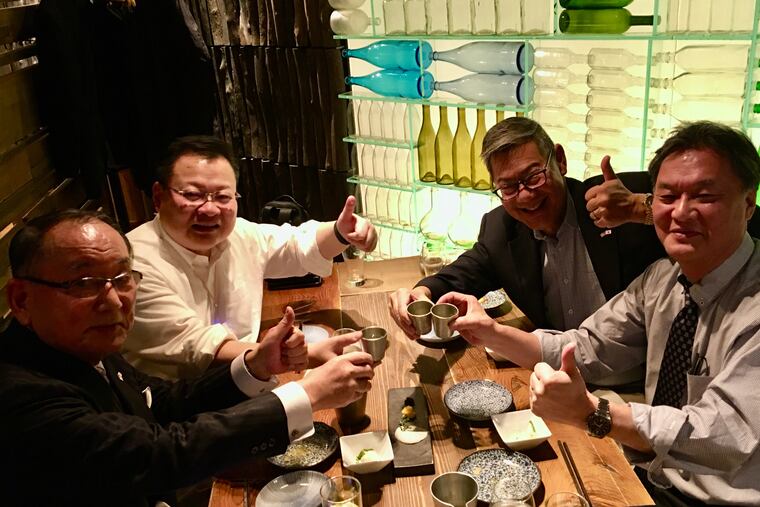Philly activists help launch American-style board challenge in corporate Japan
Exclusive: A Philadelphia lawyer, local investors, and academics have aided U.S. and Japanese investors who are prepping unprecedented battle for control of one of Japan's biggest builders. They will announce an insurgent board slate Monday, and we know who they are.

In a trans-Pacific rebellion backed by aid from Philadelphia, two Americans are joining nine Japanese executives and investors in what corporate-governance activists call an unprecedented effort to overthrow top managers at a big Japanese company.
They plan to unveil their rival board candidates, including a Main Line woman, on Monday.
The insurgents seek to persuade shareholders to vote for them to replace chairman Toshinori Abe and his allies in April 23 elections for the board of Sekisui House, a $22 billion (yearly sales, triple of Toll Bros.’) builder of homes, apartments, and hotels in Japan, Australia, and the western United States, and the new Fannie Mae headquarters in Washington.
The slate includes ousted former Sekisui chairman Isami Wada, who blames his 2018 departure on Abe’s control of internal directors who owed Abe their jobs. After an internal investigation blamed Abe for a $51 million fraud loss from a bogus land sale and recommended his dismissal, the Abe bloc outvoted outside directors. They kept Abe and sent Wada packing.
Frustrated by what he told me is Japan’s “culture of hiding things” and seeking to “save” the company he ran for 20 years, Wada has visited Philadelphia and New York with an international advisers’ team. That included Shanghai- and New York-based lawyer Shikun Gao, who says victory will encourage corporate reform elsewhere in Asia; Philadelphia lawyer William Uchimoto, a Japanese American former lawyer with the Securities and Exchange Commission and Philadelphia Stock Exchange; plus U.S. investors, in consultation with corporate-governance experts at the University of Delaware, Drexel University, and the University of Pennsylvania.
The insurgent board candidates include Wada; two foreign-based Sekisui executives, who allies say are risking their jobs; sitting directors Fumiyasu Suguru and Koji Yamada; and two Americans, Pamela Fennell Jacobs, chief sustainability officer at Spouting Rock Asset Management in Bryn Mawr, and Chart Group chairman Christopher Douglas Brady, who once ran President George H.W. Bush’s New Jersey campaign.
Other insurgents include a Japanese economics professor, a director of Fujitec, and the general counsel at Nikko Chemicals.
An internal investigation, made before Wada’s ouster and posted by the insurgents in English translation on their website, SaveSekisuiHouse.com, found that managers reporting to Abe, then the CEO, accepted a cashier’s check — instead of the usual monitored electronic bank payments — in payment for a Tokyo property the supposed seller didn’t own. They then failed to report the fraud and forced out officials who complained.
The investigation report had called on the company to dismiss Abe. But instead, Wada and his supporters say, Abe rallied inside directors to outvote independent directors and force Wada to “retire.”
In formal statements to the Japanese media and investors, Abe has denied wrongdoing. Sekisui did not respond to requests for comment.
Wada and Uchimoto say Sekisui’s inability to clean house, and Japanese regulators’ failure to intervene, fueled their call for investors to vote against Abe in last year’s board election. With no opposition candidate at that time, Abe was reelected, but with just 69% of the vote, vs. more than 95% for outside directors.
This time, they hope to oust Abe and his supporters.
On his visit to Philadelphia last summer, Wada, 78, stayed and dined at the Union League, ate half a cheesesteak, and visited the Rocky Steps between meetings with Michelle Lowry, director of Drexel’s corporate governance program, and local Sekisui shareholders.
He recounted his story over breakfast at the league. “It’s very shameful, what happened, and there were a lot of irregularities, in terms of how the land was purchased and the payment made,” he said through a translator. “This could happen because the CEO of the company, Mr. Abe at the time, signed off on it.”
Wada said the independent investigation he commissioned found that the true owner of the property sent Abe’s administration “four warning letters,” which they “ignored” before giving the fraudsters the sale money. Company leaders even accelerated payments to the fraudsters, as if to give them “additional time to escape,” he added, emphasizing with head nods and movements of his right fist and his open left hand. Even with the money lost, “they did not even file a lawsuit.”
I noted Sekisui House revenues and earnings have held almost steady since his departure, and the share price has risen with the rest of the market. But Wada says a string of asset sales that boost revenues on a one-time basis shows the company is having a tough time landing new deals.
“It is very rare” for a Japanese company to vote out a sitting director, says Ken Hokugo, an institutional investment manager and senior director of the 2,000-member Japan Pension Fund Association.
Meeting with Wada supporters at University of Delaware professor Charles Elson’s corporate governance program last month, Hokugo cited last year’s resignation of building supplies company Lixil’s chairman, Yoichiro Ushioda, under foreign investor pressure after he fired two top executives popular with shareholders, as a rare sign of change.
In a report distributed to fund managers, Hokugo wrote that half of Japanese companies’ book (asset) values are higher than their stock-market prices — meaning they would be worth more sold off in pieces, a sign they aren’t being run for their owners’ benefit.
Uchimoto says big U.S. investors such as BlackRock and Vanguard made up the bulk of the “no” votes in last year’s uncontested election. Elson gives that the Sekisui House insurgents “are within striking distance of winning” — if they can convince Japanese investors they now have a better choice.